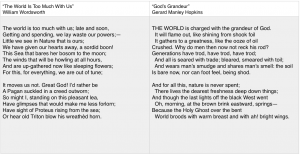*if the above image is unclear, click into it — that should open an image with higher quality
When we were analyzing Hopkins’ “Gods Grandeur,” I couldn’t stop thinking about the similarities between it and the Wordsworth poem “The World Is Too Much With Us” (which also happens to be the only Wordsworth poem I’ve read). Both poems deliver a similar message; they describe the worsening disconnect between man and nature and refer back to a time when the beauty and power of the natural world was appreciated. In both poems, a Petrarchan sonnet is the form used to deliver such a message. Petrarchan sonnets are unique in the way which their form is utilized: the octave generally presents an issue or problem, and a response or solution is proposed in the following sestet. Both Hopkins and Wordsworth present the issue of a growing disconnect from nature, which they then later claim needs to be appreciated as the divine form that it is.
It can be seen that both poets have chosen to begin the poem with “The World” (1). Once again, their similar thoughts are evident in that the environmental issues associated with industrialization are described as something global, a problem which encompasses each person who lives in the world. Hopkins and Wordsworth then both claim mankind is responsible for such a disaster: Wordsworth describes mankind as being “out of tune” with nature, and Hopkins similarly says that men have lost all connection with nature.
In the sestet, differences between Wordsworth and Hopkins begin to emerge. Wordsworth blatantly claims that he would rather “be/ A Pagan” than suffer through an increasingly unnatural world. He then goes on to refer to divinity in nature with ancient Greek figures, specifically naming Proteus and Triton. This clear rejection of established, industrial England is very different from Hopkins’ sestet, which proves to be much more optimistic. He claims that “nature is never spent” despite all it has gone through, and proceeds to describe a beautiful image of “the Holy Ghost” which can be seen as the world recovers. Hopkins’ optimistic, religious conclusion can be contrasted with Wordsworth’s much more pessimistic and cynical conclusion. Despite these overall differences, the two poets show great similarities in the way which they perceive and communicate ideas; it is no wonder that they are now both recognized as great figures in English poetry.

